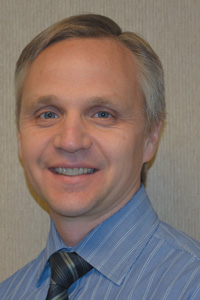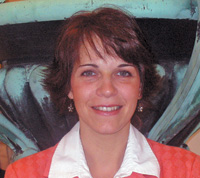Time of transition: Bridgton Hospital follows trend by adding hospitalist program; recruiting doctors
By Wayne E. Rivet
Staff Writer
When David Frum was a child, his family doctor was always there to treat whatever ill or injury ailed him.
“Back then, doctors hung their shingle and spent their entire career in one place,†said Frum, president of Bridgton Hospital said. “That is not the nature of health care these days.â€
Today, many primary care physicians are employed by hospitals, foregoing setting up private practices. Like any employee in today’s workforce, doctors frequently move on to other job opportunities — sometimes to seek greater challenges presented at larger facilities, better pay or due to lifestyle needs.
To address “balance of life†issues and “consistency of care†matters, hospitals across the country have implemented hospitalists programs. A hospitalist is a physician, most commonly an internal medicine doctor, who focuses his/her time, energy and practice on patients admitted to the hospital.
Meanwhile, primary care physicians can concentrate on their own outside practices, and not be forced to reschedule or make patients wait for long periods of time due to an emergency call at the hospital.
“The trend nationally is that fewer and fewer primary care physicians are choosing to follow their patients into the hospital. They want to focus on their practices in an outpatient setting,†Frum said. “The reality around the nation is that the marketplace is pushing us to go to a hospitalist program. Of all the internal medicine candidates coming out of their training, more than 50% are choosing to become hospitalists.â€
Frum sees two major advantages to this approach. One is consistency of care.
“There is study after study that if you reduce variation, you improve quality. A key component of implementing a hospitalist program is to assure our inpatients are receiving consistency of care day in and day out,†Frum said. “If you have two or three hospitalists versus 15 or 20 different physicians attending to our inpatients, you reduce the variation and you create a higher consistency of care. Consistency and efficiency outweigh the historical model of a doctor following the patient through the whole system of care.â€
Last October, Bridgton Hospital implemented the first phase of the hospitalist program by bringing onboard three doctors — Deanna Carty, Alan Verrill and Stephen Ward — to work the 7:30 a.m. to 5:30 p.m. shift, seven days a week. The next step will be to create nighttime coverage, Frum said. Until then, primary care physicians will manage admissions after 5:30 p.m.
“Right now, we’re living in two worlds until we create the next piece of the puzzle,†Frum said. “We will get to 24-hour coverage before the end of this calendar year.â€
Before arriving at Bridgton Hospital, Dr. Carty worked as a hospitalist for four years. Here, she returned to primary care until making the change this past fall.
“I have enjoyed elements of both parts of my practice and will miss the relationships I have formed with many of my patients,†she said. “My decision to return to hospital-based medicine allows me to focus my energy, skills and experience on providing patients in the hospital with the best care possible.â€
Dr. Carty sees the hospitalist program as a win-win situation for both the patient and physicians.
“There are many advantages to having a hospitalist program, most importantly is immediate access to quality medical care. Physicians here at Bridgton Hospital really want to give the best care possible to our patients, whether in the office or in the hospital, but we can’t be in two places at once,†Dr. Carty said. “When you are critically ill, you want to have a doctor immediately available to treat you, not in the office 20 minutes away. On the other hand, if you have a cough and a fever, you may need a same day office visit. Having your primary care physician working only in the office should improve your access to that provider when you need to be seen, while the hospitalist is available for all of your needs if you are admitted to the hospital.â€
Frum pointed out that the hospitalist program also provides some “balance of life†for physicians.
“Doctors have families too, and would like to organize their work and their daily lives. The hospitalist program allows for balance for both the primary care physician and the hospitalist. Both can get a better handle on their work week,†Frum said.
For the hospitalist program to work smoothly, Dr. Carty believes strong communication between all providers involved in the patient’s care is required.
“The hospitalist should communicate directly with the primary care provider during a patient’s hospital stay to make certain that he/she has a full understanding of what happened to the patient during his/her hospitalization,†she said.
Dr. Carty also sees the hospitalist program as a key recruiting tool as Bridgton Hospital seeks new physicians, as well as a means to retain current primary care physicians.
Generally, rural hospitals do struggle to retain physicians and recruit new doctors, but Frum has found Bridgton Hospital has enjoyed “good staying power.â€
“It’s a great testimony to the organization, to the offerings of this community, and livability of this area,†he said. “We’ve had better luck at longer-term staying power for our physicians. That doesn’t mean we’re not subject to changes. Any facility will have turnover.â€
Staffing changes
Over the past few months, Bridgton Hospital has experienced a turnover in its physician group.
One internist decided to return to a larger-setting, opting to work at Central Maine Medical Center.
Two primary care physicians (Dr. Carty, being one) decided to become hospitalists.
A third physician left for a job in Portland.
“Physicians, much like anyone else in the work world, are making career decisions that best fit their needs. It’s the nature of an employed medical staff,†Frum said. “A generation or two ago, an overwhelming majority of physicians were independent, not employed by hospitals. Today, here in Maine, 65 to 70% of primary care physicians are employed by hospitals.â€
Frum said Bridgton Hospital is “committed†to meeting the health care needs of the community, and he fully understands concerns residents may have as the result of the doctors’ departures.
“As CEO, I am extremely sensitive to the bond between the patient and provider. I realize when you have a change that can create concern in the community. No question, in a smaller community like ours, our physicians have stronger ties because they are part of the local fabric. We absolutely understand that when a provider moves on, it has an impact on the community. So when you have a transition, it absolutely creates a sense of urgency — ‘What do I do now as a patient?’ ‘I’ve known this doctor for X number of years and now I need to find another provider?’ This is where the institution comes in,†he said. “We’re (BH) financially sound, and because we are sound, we are going to spend the resources to meet the primary care needs of the community.â€
To address the departures, Bridgton Hospital has hired an external recruitment firm.
“We never stop recruiting, even when we don’t have turnover,†Frum added. “We realize we need to take a laser-like approach to add some providers. Change is something that comes difficult for everyone. We can’t change life and career decisions, but we can assure the needs of our community are met. We’re confident in this organization’s ability to change and evolve where the market is taking us to, as well as meeting the primary care needs of our community.â€
Meanwhile, the hospital will lean on its relationship with Central Maine Medical Center to fill gaps until permanent solutions can be found. Internist Susan Paul has arrived, and will be at the hospital five days a week.
“An advantage of being part of a system allows us to secure someone immediately while we are recruiting for more permanent solutions,†Frum said. “If we were a stand-alone facility, that would be impossible.â€
Always seeking ways to increase “access,†Bridgton Hospital plans to expand its highly successful Urgent Care program to six days a week, beginning June 18. The hospital has also added a variety of specialty services, again tapping into the CMMC pool of physicians, who travel here so residents can receive medical assistance locally.
“It is a very significant financial commitment for a small hospital (to offer a hospitalist program), but one we know will provide the highest, consistent quality of care that our patients expect and deserve,†Frum said. “We continue to be the most cost-efficient hospital in the state and continue to be on the state’s ‘preferred provider’ list for providing quality in a cost-efficient fashion.â€




